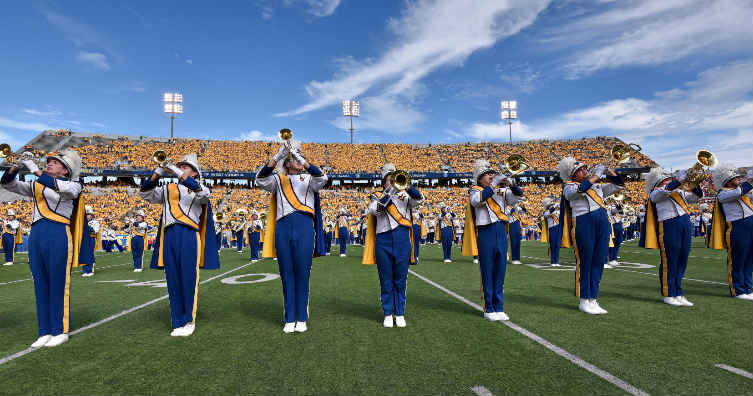10 ways American universities are different from the UK
The US is home to some of the best universities in the world, but how do they differ from the UK? Some of these facts might surprise you.

Credit: Aspen Photo – Shutterstock
Universities in America work very differently from those in the UK. From assessments and grading to accommodation and sports teams, there are loads of things that make studying in the US a unique experience.
You've probably seen plenty of movies and TV shows about university life in the US, but it's tricky to separate fact from fiction.
How does American university work? What is a major? And just how expensive are American tuition fees? We answer all your burning questions below.
What is college in America?
In America, smaller institutions that offer associate degrees, certificates and bachelor degrees are often referred to as colleges, whereas universities offer both undergraduate and postgraduate degrees. But the terms 'college' and 'university' are generally used interchangeably to address higher education in the US.
Since colleges in the UK are for 16-18-year-olds studying A-Levels or equivalent, we'll be sticking with the term 'university' throughout to avoid confusion.
Differences between US and UK universities
These are some of the main differences you can expect when studying in America:
-
Degrees are longer in the US
In the UK, the majority of Bachelor's degrees last three years – unless you're studying in Scotland, where most degrees take four years.
In the US, however, most degree courses run for four years (with some lasting as long as six years) as there's more emphasis on studying a breadth of different subjects. You should generally expect to spend a year longer studying a course in the US than in the UK.
It is also worth noting that, unlike in the UK, most PhD programmes in the US don't require students to have a Master's degree to be accepted. It's quite common for students to move straight into a PhD from undergrad.
If you're aiming for a super prestigious degree, we'd recommend checking out the Ivy League unis and having a read of our guide to applying to American unis.
-
The grades system is different
In the UK, you will be awarded a percentage for every assessment you complete. These are then averaged out across your whole degree (some will be worth more than others) to form your final degree classification.
This works out as 70% and above for a first (first class honours), 60% – 70% for a 2:1 (upper second class honours), 50% – 60% for a 2:2 (lower second class honours), and 40% – 50% for a third (third class honours).
Students who fail to achieve a third by just a few marks will receive an Ordinary Degree, without Honours.
However, the American degree classification works differently. All assessments are graded A–F. At the end of your degree, these are averaged out and converted into a Grade Point Average (GPA), ranging from 0–4.
American GPA to UK grades
GPA UK marks UK degree classification 4 70+ First class honours 3.7 65–69 Upper-second class honours 3.3 60–64 Upper-second class honours 3 55–59 Lower-second class honours 2.7 50–54 Lower-second class honours 2.3 45–49 Third class honours 2 40–44 Third class honours 1 35–39 Ordinary/Unclassified degree 0 Below 35 Ordinary/Unclassified degree -
You study more different subjects in the US

Credit: Africa Studio – Shutterstock
In your first year or two at a US university, you'll study a wide range of subjects, similar to what you will have experienced in secondary school. For instance, even if you're studying a liberal arts degree, you might be expected to take a module in maths.
You'll progress from your freshmen (first) year, into your sophomore (second), junior (third) and senior (you guessed it... fourth) years, where you will have a chance to focus on a subject you really want to study.
However, even once you've declared your major (your main degree subject), you'll still be expected to take modules in other subjects.
Meanwhile, in the UK, it's common to take elective modules in different subjects throughout your first couple of years but to hone in on a specialist subject in your final year.
The application system for applying to uni in the US is very different too! We've got a guide to show you how to apply to American universities and how much it costs. -
There are more assessments in American universities
In the UK, most uni modules will have two or three major assessments throughout the semester – perhaps one or two pieces of coursework and a big exam at the end.
In the US, however, there are lots more assessments in the form of essays, quizzes and regular homework throughout the year. It means there's less time to relax, but also less pressure to do well in end-of-semester exams.
Although all courses will differ, American universities tend to place a greater emphasis on coursework than exams. Plus, because there's much less independent study, attendance is taken very seriously. You will be dropped grades if you keep failing to turn up.
-
American degrees cost more money
Although at £9,000+ a year, UK tuition fees are hardly cheap, American universities are seriously costly. Fees vary depending on the length of your course, whether you're studying in the same state you live in or moving away, and whether you choose a public or private university.
Most of the top US universities are private (Yale, Harvard, etc.), and the average fees for a four-year course are around £33,000 ($39,400) a year. In many cases, fees will be much more than this though!
This also means that it's incredibly common for US university students to have a part-time job to pay their way through their course. Others spend two years at a community college first, which is a lot cheaper than university.
Read our complete guide to university fees in the USA for the lowdown on how much students pay in tuition fees and living costs on average.
-
Term dates aren't the same

Credit: Chutima Chaochaiya - Shutterstock
Although it varies across different universities, most academic terms in the US start mid- to late-August. Meanwhile, courses in the UK typically start in September, although some start as late as October.
Most universities in America will then have a really long Christmas vacation, normally starting in mid-December but sometimes in late-November for Thanksgiving, with studies recommencing in mid-January.
However, UK Christmas breaks tend to be shorter, but then students will get another holiday over Easter soon after.
-
Sports are a big part of US university life
Of course, UK universities have sports teams and students are encouraged to take part. Many compete against their rival university in a Varsity tournament each year.
But in the US, sport is HUGE. College football matches are almost as popular as professional ones and many talented students secure their place at university by receiving a sports scholarship.
Games are fiercely competitive and attending big matches is the highlight of many students' terms.
-
Most students have to share a room in America
This is something you might have spotted in American TV shows and movies. Many US college students share a bedroom in university halls with a roommate (and sometimes more than one).
US universities are keen to foster a welcoming community, and having a roommate is an ideal way to make friends.
This is pretty unheard of in the UK (although it does happen in some universities). For most students, their main worry is whether to go for an en suite or not when living in halls.
Many UK halls of residents are uncatered, meaning students make their own food in the kitchens provided. This is much rarer in the US – most students eat their meals in a cafeteria.
-
Drinking culture isn't as big on US campuses

Credit: Jacob Lund – Shutterstock
In the US, the legal drinking age is 21, so many university students can't drink for their first couple of years if they start their studies at 18. This means events like freshers' week (also known as orientation week across the pond) aren't so focused on drinking.
Events are more likely to include quizzes, day trips and team-building activities, rather than bar crawls and foam parties.
This is quite different from the UK, where freshers' week can seem to revolve around club nights, flat parties and other alcohol-related activities. However, there are plenty of other fun things you can do with your new friends that don't involve drinking.
-
American universities have fraternities and sororities
If you've watched a movie about university life in America (Bad Neighbours, 22 Jump Street... even Monsters University), you'll have come across fraternities and sororities.
These are exclusive social groups at some universities – fraternities are for men (or sometimes mixed) and sororities are for women. Members will party together, go on day trips, carry out community work and sometimes live together in designated houses.
Students have to be invited and complete a pledging process to become members. Some groups organise humiliating or abusive challenges and tasks for prospective members, known as hazing, but this has now been outlawed in 44 states.
It's not dissimilar from the initiation tasks used by societies and sports teams in the UK for new starters, but universities are starting to crack down on these.
Wondering how to apply to an American university and how much it'll cost? We've got a full guide to studying in America.








